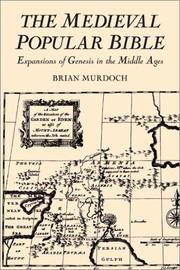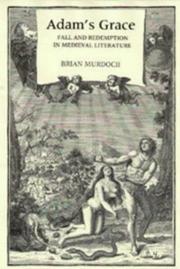| Listing 1 - 10 of 35 | << page >> |
Sort by
|
Book
ISBN: 9780199596409 0199596409 0191745731 1283584220 0191626694 9786613896674 Year: 2012 Publisher: Oxford Oxford University Press
Abstract | Keywords | Export | Availability | Bookmark
 Loading...
Loading...Choose an application
- Reference Manager
- EndNote
- RefWorks (Direct export to RefWorks)
The story of the apocryphal pope and saint Gregorius was extremely popular throughout the middle ages and later in Europe and beyond. In a memorable narrative Gregorius is born from an incestuous relationship between a noble brother and sister, and is set out to sea with (unspecific) details of his origin. He is found and brought up by an abbot, but when revealed as a foundling leaves as a knight to seek his origins; he rescues his mother's land from attack, and marries her. On discovering his sin he undertakes years of penance on a rocky islet, which he survives miraculously. An angel sends emissaries from Rome to find him after the death of the pope, the key to his shackles is equally miraculously discovered, and he becomes pope. This hagiographical romance is not a variation upon Oedipus; it uses the invisible sin of incest as a parallel both for original sin (the sin of Adam and Eve) and for actual sin. It combines the universal theme of the quest for identity with the problem not of guilt as such, which is inevitable, but of how sinful humanity can cope with it. Brian Murdoch traces the story's probable origins in medieval England or France, and its later appearance in versions from Iceland and Ireland to Iraq and Egypt, in verse and prose, in full-scale literary forms or in much-reduced folktales, in theological as well as secular contexts, down to Thomas Mann and beyond.
Gregory I [Pope] --- Christian hagiography. --- Hagiographie chrétienne --- Gregory, --- Legends. --- Gregorius (Legendary character) --- Incest in literature --- Christian hagiography --- Hartmann, --- 235.3 "04/14" --- 235.3 GREGORIUS --- Hagiografie--Middeleeuwen --- Hagiografie--GREGORIUS --- Hagiographie chrétienne --- Gregorius peccator --- Hartmann, - von Aue, - active 12th century. - Gregorius

ISBN: 0859917762 Year: 2003 Publisher: Cambridge D.S. Brewer
Abstract | Keywords | Export | Availability | Bookmark
 Loading...
Loading...Choose an application
- Reference Manager
- EndNote
- RefWorks (Direct export to RefWorks)
222.2 --- Genesis --- Bible. O.T. Genesis --- Criticism, interpretation, etc --- History --- Middle Ages, 600-1500 --- Paraphrases --- History and criticism --- Middle Ages, 500-1500 --- Bible. --- Be-reshit (Book of the Old Testament) --- Bereshit (Book of the Old Testament) --- Bytie (Book of the Old Testament) --- Chʻangsegi (Book of the Old Testament) --- Genesis (Book of the Old Testament) --- Sifr al-Takwīn --- Takwīn (Book of the Old Testament) --- Criticism, interpretation, etc. --- History and criticism.

ISBN: 085991559X 0585287716 9786610545254 1280545259 1846150019 Year: 2000 Publisher: Cambridge Brewer
Abstract | Keywords | Export | Availability | Bookmark
 Loading...
Loading...Choose an application
- Reference Manager
- EndNote
- RefWorks (Direct export to RefWorks)
A study of the use of medieval literary texts to explain the Fall and Redemption, the universality of original sin, and the identity of mankind with Adam and Eve. 'The Fall of Adam and the redemption of mankind has been one of the central myths of Western European civilisation for nearly two thousand years; any increase in our understanding of the way in which it has been understood and represented is an increase in our understanding of the whole of European sensibility. This is what the author has achieved in this book... Despite the immense amount of information that is given, the author's own prose has such clarity and fluencey that noone could help but be informed and entertained.' JOURNAL OF THEOLOGICAL STUDIES. The theme of 'Adam's Grace' is the interplay of theology and literature across a wide range of genres and vernaculars: in particular, the use of medieval literary texts to explain the balance of the Fall and Redemption, the universality of original sin, and the identity of mankind with its first parents, Adam and Eve. The process begins with the Christian tradition of apocryphal Adam-lives, which live on and develop in many vernaculars. Later, Adam is used as a literary model, on whom many well-known Christian figures of the middle ages - knights, popes, emperors, kings and saints - can be seen to be based. They include Gregorius, the "medieval Oedipus", whose case demonstrates the resolution of the paradox of the 'felix culpa'; Parzival, searching for the Holy Grail and for God in the hostile world into which he has been ejected; and the many medieval figures (literary and even historical) associated with the legends of leprosy, blood and healing which reflect the sacrifice in the Redemption. The last part of the book looks at the drama, first of all the medieval representations of the Fall and the Passion, and then the rather different portrayal of Adam on stage in the Reformation and the Counter-Reformation. BRIAN MURDOCH is Professor of German at Stirling University.
Book
ISBN: 1800104022 1800104030 1640141170 Year: 2022 Publisher: Rochester, New York : Camden House,
Abstract | Keywords | Export | Availability | Bookmark
 Loading...
Loading...Choose an application
- Reference Manager
- EndNote
- RefWorks (Direct export to RefWorks)
Death still comes to everyman, but this study of three twentieth-century German plays shows the harder challenge of living without salvation in an age of war and unprecedented mass destruction.
German drama --- War in literature. --- History and criticism. --- Toller, Ernst, --- Borchert, Wolfgang, --- Frisch, Max, --- Death. --- Everyman. --- Existential Guilt. --- German Drama. --- Identity. --- Morality. --- Politics. --- Twentieth Century. --- War.
Multi
ISBN: 9781800104020 9781640141179 Year: 2022 Publisher: Rochester, N.Y. Camden House
Abstract | Keywords | Export | Availability | Bookmark
 Loading...
Loading...Choose an application
- Reference Manager
- EndNote
- RefWorks (Direct export to RefWorks)
"This study aims to provide new interpretations of three major German plays about war in the twentieth century by looking at them through the lens of the medieval English Everyman play, moving them away from their historical contexts and highlighting their broader philosophical importance. The plays are Ernst Toller's Hinkemann, Wolfgang Borchert's Draussen vor der Tür (The Man Outside); and Max Frisch's Biedermann und die Brandstifter (The Arsonists); Hugo von Hofmannsthal's adaptation of the medieval Everyman play is also touched on "--
Drama --- Thematology --- German literature --- anno 1900-1999

ISBN: 1281949361 9786611949365 1571136770 1571133283 Year: 2006 Publisher: Rochester, NY : Camden House,
Abstract | Keywords | Export | Availability | Bookmark
 Loading...
Loading...Choose an application
- Reference Manager
- EndNote
- RefWorks (Direct export to RefWorks)
Erich Maria Remarque is a writer of great popularity who has rightly been described as a "chronicler of the twentieth century." He is both a German writer and a genuinely international one. Although he spent much of his life in exile from Germany, most of his novels reflect its twentieth-century history: the two world wars and the Weimar and Nazi regimes, and especially their effects on the individual. His portrayals of the lives of refugees from Nazi Germany are especially vivid. His themes are universal, dealing with human relationships, with love in particular, and with the provisional nature of life. Often seen as a one-novel writer due to the immense success of All Quiet on the Western Front, Remarque wrote many other novels, major works that have nearly all been filmed and have remained popular. Nor should it be ignored that his works are above all else immensely readable: not a negligible criterion. This new study of Remarque's novels treats them as a chronicle of the century, but also looks at them as works that go beyond the reflection of historical events.
Remarque, Erich Maria, --- Criticism and interpretation. --- Remarque, Erich Maria. --- Remarque, Erich Maria --- Remark, Erich Paul --- Remark, Erikh Marii̐a --- Ремарк, Эрих Мария --- Ремарк, Э. М., --- Remarque, E. M. --- Ремарк, Ерих Мария --- Ремаркъ, Ерихъ Мария --- Rimarḳ, Erikh Mariyah --- רמרק, אריך מריא, --- רמרק, אריך מריה, --- רעמארק, עריך מאריא, --- רעמארק, עריק מאריא --- רעמארק, ע. --- רעמארק, ע. מ. --- רימארק, אריך מאריה --- Rimārk, Irīsh Māriyā --- رمارک، اريش ماريا --- LITERARY CRITICISM / European / German. --- Black American Experience. --- Cinematic Representation. --- Erich Maria Remarque. --- Literary Adaptations. --- Love. --- Nazi Regimes. --- One-Novel Writer. --- Popular Literature. --- Provisional Nature of Life. --- Refugees. --- Twentieth Century. --- Weimar. --- World Wars.
Book
ISBN: 9781846150012 9780859915595 Year: 2000 Publisher: Suffolk Boydell & Brewer
Abstract | Keywords | Export | Availability | Bookmark
 Loading...
Loading...Choose an application
- Reference Manager
- EndNote
- RefWorks (Direct export to RefWorks)

ISBN: 9781571136770 9781571133281 9781571134769 Year: 2006 Publisher: Rochester, NY Camden House
Abstract | Keywords | Export | Availability | Bookmark
 Loading...
Loading...Choose an application
- Reference Manager
- EndNote
- RefWorks (Direct export to RefWorks)
Book
Year: 1977 Publisher: Amsterdam Rodopi
Abstract | Keywords | Export | Availability | Bookmark
 Loading...
Loading...Choose an application
- Reference Manager
- EndNote
- RefWorks (Direct export to RefWorks)
Book
Year: 1972 Publisher: Gà¶ppingen Kà¼mmerle
Abstract | Keywords | Export | Availability | Bookmark
 Loading...
Loading...Choose an application
- Reference Manager
- EndNote
- RefWorks (Direct export to RefWorks)
| Listing 1 - 10 of 35 | << page >> |
Sort by
|

 Search
Search Feedback
Feedback About UniCat
About UniCat  Help
Help News
News